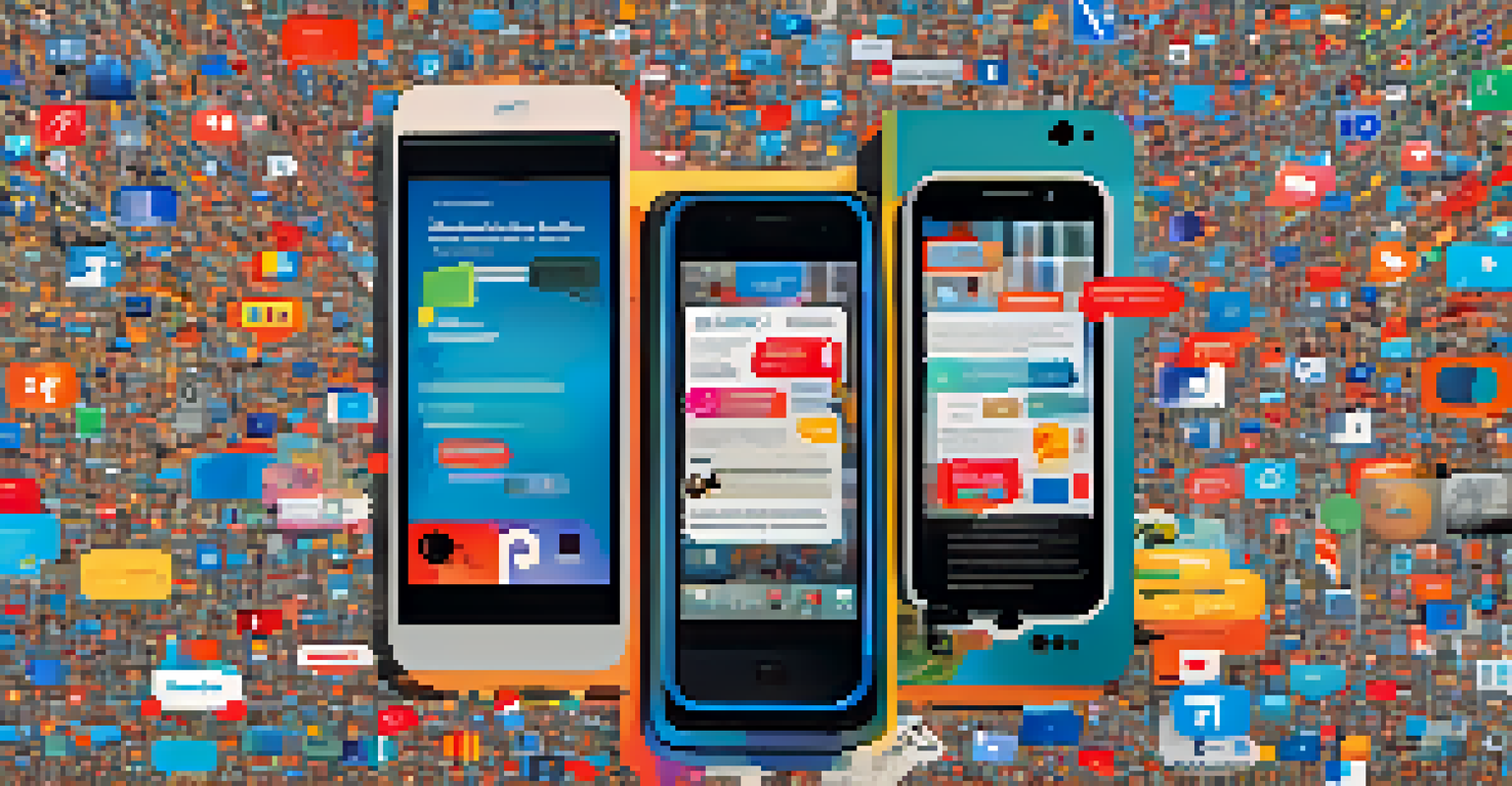Digital Media and Its Role in NYC’s Political Discourse

Introduction to Digital Media's Role in Politics
Digital media has revolutionized how we engage with political issues, especially in a bustling metropolis like New York City. Gone are the days when mainstream media held a monopoly on political discourse; now, social media platforms and digital outlets play a pivotal role. This transition has not only democratized information but also diversified the voices that shape public opinion.
The medium is the message.
In New York City, where political engagement is often vibrant and multifaceted, digital media serves as a critical tool for both politicians and constituents. Platforms like Twitter, Facebook, and Instagram have become virtual town squares, where debates and discussions unfold in real-time. This shift has encouraged more people to participate in political conversations, breaking down barriers to access and engagement.
However, with this newfound accessibility comes the challenge of misinformation and echo chambers. As individuals curate their news feeds, they may inadvertently limit their exposure to diverse viewpoints, which can polarize discussions. Understanding the role of digital media in this context is essential for navigating the complex landscape of NYC's political discourse.
The Evolution of Political Campaigning in NYC
Political campaigning in New York City has evolved dramatically with the rise of digital media. Candidates now leverage social media to connect with voters, share their platforms, and mobilize support in ways that were unimaginable just a couple of decades ago. This shift has made campaigns more dynamic, allowing for real-time feedback and engagement.

For example, during local elections, candidates often use platforms like Instagram to showcase their personalities and connect with younger voters. This approach not only humanizes candidates but also fosters a sense of community among supporters. As a result, voters feel more invested in the political process, as they can engage directly with those vying for public office.
Digital Media Transforms Campaigning
Political campaigns in NYC now utilize social media to connect with voters and enhance engagement through real-time interactions.
Moreover, digital media allows for targeted advertising, enabling campaigns to reach specific demographics with tailored messages. This precision can enhance voter turnout and engagement, as candidates can address the unique concerns of various communities across the city's diverse landscape.
Social Media: A Double-Edged Sword
While social media has opened up new avenues for political discourse, it also poses significant challenges. The rapid spread of information can lead to the dissemination of false narratives, which can sway public opinion and manipulate political outcomes. In a city as diverse as New York, where every voice matters, this can have particularly damaging effects.
In the age of information, ignorance is a choice.
For instance, during election cycles, misinformation campaigns can create confusion and distrust among voters. Instances of fake news and misleading posts can overshadow genuine political discussions, making it difficult for citizens to discern fact from fiction. This reality underscores the importance of media literacy in an era where digital platforms are the primary sources of news for many.
Moreover, the algorithm-driven nature of social media often creates echo chambers, where individuals are exposed primarily to viewpoints that align with their own. This can stifle meaningful dialogue and reduce the chances of finding common ground on important issues.
Activism and Grassroots Movements Online
Digital media has also empowered grassroots movements and activism in New York City. Social media platforms provide a space for organizing protests, sharing resources, and raising awareness about pressing issues. This newfound ability to mobilize quickly can lead to significant changes in policy and public opinion.
For example, movements like Black Lives Matter have gained substantial traction through digital campaigns, bringing attention to systemic injustices. By using hashtags and viral content, activists can amplify their messages and reach millions of people in a matter of hours. This democratization of activism allows for a broader coalition of voices to be heard.
Social Media's Misinformation Risk
The rapid spread of information on social media can lead to misinformation, creating confusion and distrust among voters.
Furthermore, online petitions and crowdfunding campaigns have become essential tools for grassroots organizations. These platforms enable advocates to rally support and resources quickly, demonstrating the power of collective action in the digital age.
The Role of Influencers in Political Discourse
In today's digital landscape, influencers have emerged as significant players in political discourse. These individuals, often with sizable followings, can sway public opinion and spark conversations around critical issues. In a city like New York, where diversity reigns, influencers can represent various perspectives and amplify underrepresented voices.
For instance, influencers may use their platforms to promote civic engagement, encouraging their followers to vote or participate in local events. By leveraging their reach, they can inspire action and foster a sense of community among their audience. This power can be particularly impactful in mobilizing younger voters who may feel disconnected from traditional political channels.
However, the influence of these figures also raises questions about accountability and authenticity. As influencers engage in political discourse, it's essential to consider the motivations behind their messages and the potential impact on their followers' beliefs and actions.
The Impact of Digital News Outlets
Digital news outlets have transformed how New Yorkers consume political information. Unlike traditional media, these platforms often prioritize speed and accessibility, delivering real-time updates on political events and issues. This immediacy can keep the public informed and engaged, but it also raises concerns about the quality of reporting.
Many digital news sources are designed for rapid consumption, often sacrificing in-depth analysis for quick headlines. While this approach can draw attention to vital issues, it may lead to superficial understanding and encourage sensationalism. In a city as complex as New York, nuanced reporting is essential for fostering informed discussions.
Activism Thrives in Digital Spaces
Grassroots movements in NYC leverage digital media to organize protests and raise awareness, showcasing the power of collective action online.
Additionally, the rise of paywalls and subscription models can limit access to quality journalism. As some New Yorkers turn to alternative, often less credible sources for information, the challenge of discerning reliable news becomes even more pronounced.
Conclusion: Navigating the Digital Political Landscape
As digital media continues to shape NYC's political discourse, it's crucial for citizens to navigate this landscape thoughtfully. Engaging with diverse sources of information, questioning narratives, and participating in discussions can help foster a more informed electorate. The responsibility lies with both individuals and platforms to prioritize transparency and accuracy.
Moreover, as technology evolves, so too must our understanding of its implications for political engagement. Embracing media literacy and critical thinking will empower New Yorkers to contribute meaningfully to political discourse and hold leaders accountable.

Ultimately, the interplay between digital media and politics presents both opportunities and challenges. By recognizing the power of our voices in this digital age, we can work towards a more inclusive and informed political landscape, reflecting the rich tapestry of New York City.